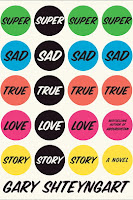 |
| Bike Art on the Trail from Last Fall |
We rode our bikes. You all know how good it feels to ride a trail when it's not raining. It has been mucky, muddy, and rainy for weeks. There was so much flooding last year that many trails are closed. Very few were out on the woodsy trail we rode today, due to the grand opening of another bike trail. Actually we've been on that trail, too, but this was a special celebration.
The wind just about gusted us off the path in a few places. We saw some who gave up. Fortunately it was at our back on the way home.
We took a break for half an hour and as usual we read. The husband: nature essays. I lay down on a bench and finished Mary Webb's Precious Bane.
The short biography of Mary Webb at the beginning of my 1938 Modern Library edition of her masterpiece, Precious Bane, says:
"...Precious Bane might have languished unnoticed by the world at large and its author...might have been forgotten, had not a busy Prime Minister, Stanley Baldwin, paused to introduce and champion Mary Webb in 1928."
This edition of Webb's novel also includes Baldwin's 1928 introduction, which says her power lies in "the fusion of the elements of nature and man." And, indeed, her elegant nature writing is one of the pluses of this lovely novel.
Precious Bane, which won the Prix Femina Vie Heureuse as the best English novel of 1925, is reminiscent of Thomas Hardy's novels. Webb's pastoral novel delineates a tragedy just as deep and affecting as that of Far from the Madding Crowd, Tess of the D'Urbervilles, and Jude the Obscure. Her poeticism and allusive consciousness of Hardy's Wessex world are deliberate; her Shropshire is as gorgeous and often as forbidding as his terrain.
Yet she is a very different kind of writer. Her lyrical language is not as arresting as Hardy's, yet her sense of story is strong, and the intelligent voice of her first-person narrator, Prue, is more direct than Hardy's less personal omniscient third-person narration. She isn't quite in Hardy's class, but she is certainly worth reading. Sadly, many remember her novels only as the object of satire in Stella Gibbons's Cold Comfort Farm.
The heroine of Precious Bane, Prue, age 21, was born with a harelip. She lives and works on her parents' farm, and, though she is quick, caring, practical, and brilliant, she believes her deformity will prevent her marrying. Her rhapsodic observations of nature are her comfort. For most of the book, she lives with her ambitious brother, Gideon, and peaceful mother.
But she falls in love with a traveling weaver, who doesn't know she's alive.
"It was at a love-spinning that I saw Kester first. And if, in these new-fangled days, when strange inventions crowd upon us, when I hear tell there is even a machine coming into use in some parts of the coutnry for reaping and mowing, if those that mayhappen will read this don't know what a love-spinning was, they shall hear in good time."
The novel is intertwined with love stories: her brother Gideon's engagement to their light-hearted, giggling neighbor, Jancis, the daughter of Wizard Beguildy; and then Prue's more complicated love for Kester, the weaver, whom she gets to know indirectly through letter-writing: Gideon and Jancis are illiterate, so Prue writes her brother's letters and Kester writes Jancis's.
Prue is no prude. In one scene, she agrees to participate in a trick Wizard Beguildy plays on the squire. He says he can raise Venus, and orders Jancis to appear naked. Prue takes Jancis's place: no one can see her face. And it turns out that Kester is present: both he and the squire are smitten by her figure.
Because of Gideon's insane ambition--he works day and night on the farm to get rich--he refuses to marry Jancis even when her father says he will sell her to the squire or as a farm maid. This leads to tragedy: it makes Far, Tess and Jude look bland.
Except we know what's coming. We never know what will happen in Hardy.
I loved this novel when I read it in the '70s and rereading it has been a pleasure. And I love it that a politician would have bothered to write an introduction to the novel.








































